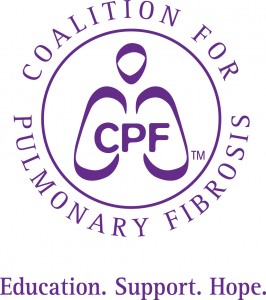CPF Names 2014 Most Important Year for Pulmonary Fibrosis
Written by |

 The Coalition for Pulmonary Fibrosis (CPF) recently published an overview of the most important 2014 developments regarding the research and treatment of pulmonary fibrosis (PF). The nonprofit organization, which was founded in 2001 with the purpose of accelerating research to find a cure for the disease, believes that 2014 was the “most important year in history for PF patients, families, physicians, researchers, advocates and industry,” as stated on the CPF’s website.
The Coalition for Pulmonary Fibrosis (CPF) recently published an overview of the most important 2014 developments regarding the research and treatment of pulmonary fibrosis (PF). The nonprofit organization, which was founded in 2001 with the purpose of accelerating research to find a cure for the disease, believes that 2014 was the “most important year in history for PF patients, families, physicians, researchers, advocates and industry,” as stated on the CPF’s website.
According to CPF, one of the most important developments for IPF in 2014 was the release of much expected data from two drug trials, one of them in the spring, and the other in mid-October, both leading to FDA approval of the first two drugs specifically directed for the treatment of idiopathic pulmonary fibrosis (IPF). Esbriet (pirfenidone), which is produced by InterMune, and Ofev (nintedanib), from Boehringer Ingelheim, were approved in October based on the results of the clinical trials, which revealed their effectiveness in slowing the progression of the disease.
After approval of the drugs, the CPF organized a webinar dedicated to patients, families and caregivers on the effectiveness and impact of Esbriet and Ofev in IPF patients, which took place at the American Thoracic Society (ATS)‘s international conference in May of 2014. Patients and families were able to have their questions answered by PF expert researcher and clinician Andrew M. Tager, MD, Associate Professor of Medicine at Harvard Medical School, and an Associate Physician of Pulmonary and Critical Care at Massachusetts General Hospital.
In addition to offering the webinar, the CPF also worked to provide patients and caregivers with information on new, specialized healthcare programs for Esbriet and Ofev, ensuring that IPF patients have access to the drugs.
[adrotate group=”3″]
In 2014 the CPF also worked in collaboration with Congress to increase efforts to help PF patients. The organization partnered with congressional staff members and prepared letters in support of PF early in the year. The campaign, which was coordinated by Senator Chris Coons and Representative Erik Paulsen, led to the drafting of two letters that were signed by 43 members of Congress and sent to the National Institutes of Health (NIH)’s Director, Francis Collins, MD, PhD and to the NIH’s National Heart, Lung Blood Institute (NHLBI) Director, Gary Gibbons, MD.
The purpose of the action was to encourage the NIH and the NHLBI to improve research efforts — including an increase in research funding — and for more focus on innovative areas of research such as Fibrosis Across Organs (FAO), a research project supported by Sen. Coons and Rep. Paulsen that has become one of the priorities for the NIH regarding PF.
Another letter was addressed from Sen. Coons, Rep. Paulsen and 18 other members of Congress to those responsible at the Centers for Medicare and Medicaid (CMS) in order to ask for the revision of approved drugs to include the latest IPF drugs, so that patients covered by Medicare would have access to the therapies.
“The CPF also assisted behind the scenes in a major effort by Sen. Coons to have PF included, for the first time, on the list of eligible research topics in the Department of Defense (DOD) Peer Reviewed Medical Research Program (PRMRP) by having it included in report language in the omnibus bill that has now been signed into law by the President,” stated the CPF about PRMRP, the official determining body of disease areas that can be funded through the DOD.
The DOD’s PRMRP, which is headed by the Secretary of Defense and the Service Surgeons General, is focused on the selection of medical research projects of excellence and importance in the field of military health. Scientists who work in PF research on this project may also apply for additional DOD research funding, which is open until the end of the 2015 fiscal year.
Additionally, the CPF believes that the month of September was “one of the most successful National PF Months in the CPF’s history,” as the fundraising and awareness campaigns included more than 50 congressional office visits, a reunion of the Daughters of Pulmonary Fibrosis at the White House, a patient event with the American Thoracic Society (ATS) and Johns Hopkins Medical Center for the celebration of the PF Week at the ATS, and the FDA’s first IPF Workshop with the presence of the CPF.
The first IPF Workshop held by the FDA, which took place on September 26, commemorated the inclusion of the disease as a research focus, and was added to the limited funding allocation mandated by Congress. The allocation is included in the Prescription Drug User Fee Act (PDUFA) and aims to increase patients’ understanding of the drug development process. The FDA’s Patient Focused Drug Development program has been designed to offer 20 disease-specific workshops for all stakeholders, and it was the first time that IPF was included, after several requests from the CPF and more than 3,000 CPF members.
The eight-member panel workshop, tasked with the purpose of deliberating on patient experiences and providing the FDA with a better understanding of the plight of patients, caregivers and family members, included lectures from four CPF advocates. The CPF’s Vice-President, Teresa Barnes, CPF’s Daughters of PF members Heather Snyder and Faye MacInnis, and longtime advocate Curt Thompson were present at the panel.
The CPF also prepared for the FDA IPF workshop by organizing a webinar to assist patients, caregivers and family members to better understand what to expect of the workshop. In addition, the CPF and FDA also offered supplemental oxygen for patients at the event and information about the event prior to its launch. Afterward, CPF prepared a report about patient experiences, which was based on the answers from a comprehensive survey of the Genetic Alliance (GA) that was delivered to the FDA.
Another CPF success story in 2014 was calling attention to PF through celebrities, receiving the help of actress Rose McGowan, who lost her father due to the disease and is now the leader of the program Daughters of PF. In addition, TV, Film and Broadway actress Barbara Barrie has recently made her IPF diagnosis public and started working with the CPF.
Every Breath Counts: Idiopathic Pulmonary Fibrosis, which aired last June, is the first documentary about the disease, and was shown again in September on the Discovery Channel. CPF helped Summer Productions to find patients and family members, and it included the sports radio host George Lapides, who has been diagnosed with the disease, as well as Country Music star Joe Nichols, who lost his father to IPF.
CPF continues its efforts to support the research community, which is working towards a cure for PF. The American Thoracic Society (ATS) is one of the organization’s closest associates, as it represents thousands of pulmonary researchers and physicians worldwide. The two co-hosted an educational event webcasted for patients worldwide in partnership with the Johns Hopkins Medical Center, which took place last September during “PF Week at the ATS.”
In addition, the ATS and CPF have granted to date more than $1 million in research from their partnership, a value added to the more than $2 million provided by the CPF alone. In 2014 alone, the ATS and the CPF have established an agreement with the Pulmonary Fibrosis Foundation in order to fund a research project for Nathan Sandbo, M.D., at the University of Wisconsin worth $100,000. Other partnerships established by the CPF include industry members and the PF medical community, in order to organize educational events to help patients who suffer from the disease.





